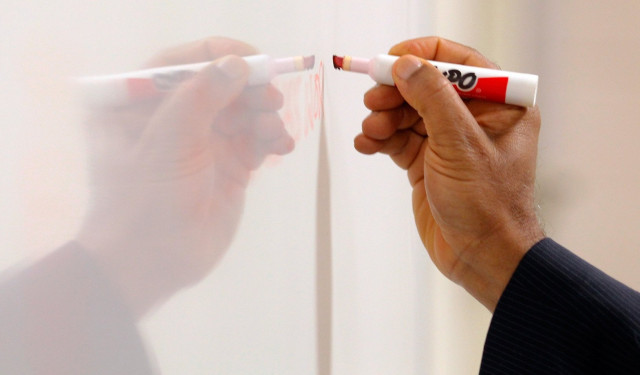Only 9% of Sindh’s teachers can teach math, science
Education minister seeks suggestions from civil society on how to ‘fix the flawed system’

Representational image. PHOTO: REUTERS
In all, there are 42,000 public schools in the province, of which a staggering 39,000 schools are limited to imparting primary-level education. This is despite the fact that the number of students at the secondary school level is much higher than their younger counterparts.
Besides, hardly 9% of the 150,000 teachers are capable of teaching Mathematics and Science subjects.
Around 10,000 schools in Sindh comprise only one room, while 17,700 schools have only one teacher. Students of around 5,000 schools are forced to sit on the ground without a roof over their heads. The number of non-functional schools in the province has reached 3,127. Although more than 7.5 million (750,000) students were admitted to nursery schools, only 440,000 could reach the intermediate level.
Candid admissions
Education Minister Syed Sardar Ali Shah opened his speech by saying that there was a lot of room for improvement in the education department, which was why the consultative workshop was being held.
That much was not lost on the audience which comprised Opposition Leader in the Sindh Assembly Firdous Shamim Naqvi, MPAs Shahrayar Mahar, Nida Khuhro, Tanzeela Qambrani, Qasim Soomro as well as a number of educationists, scholars, journalists and members of civil society.
"The government cannot fix this alone," said the education minister, "which is why we have not only asked for advice from the government's lawmakers, but also invited suggestions from the opposition as well as members of the civil society and academics." According to Shah, all the suggestions that are found to be viable will be incorporated into the education policy.
"We haven't concealed our flaws," said the education minister. "Instead, we have accepted our errors with all our heart," he added.
Suggestions
In response to a question, he said that the recruitment rules for the appointment of education officers and other staff of the department are being re-examined.
Ahmed Shah, the President of Arts Council of Pakistan, Karachi, suggested the inclusion of music and arts studies in the curriculum. He offered that the Arts Council would provide free trainers and teachers for the cause. In response, the education minister said that a departmental meeting had already taken the decision to incorporate visual and performing arts into the curriculum.
To another query, the education minister said that private schools would not be permitted to do anything that violated the law. The registration of private schools that violate the Supreme Court's orders regarding fee structure would be cancelled, he warned.
With regard to the Sindh Education Foundation, the education minister said that the chief minister was the chairperson of the SEF board and that he would talk to the CM if he received any complaints in this regard.
Workshop outcomes
For the latter part of the session, the participants were divided into 10 groups, each comprising seven to eight members. Each group was tasked to put forward its suggestions, which would then be taken up by the education department for consideration.
Naveed Sheikh, the leader of the first group stressed the need for more efforts toward gender equality. He added that mosques and madrassahs be used where there were no schools, because at least they had basic facilities such as a roof, washrooms and running water.
Zafreen, who headed the second group, suggested measures to improve teachers' performance, third-party hiring and issuing teachers' licences. On the other hand, Zeeshan, who was part of another group, focused on the need to improve students' technical abilities, adding that districts should be allocated funds in accordance with their performance. Zeeshan also recommended that transport facilities be provided to teachers as well as students since the facility was available in Punjab. Another group leader, Zareen, spoke of the need to enhance the capacity of teachers. She suggested offering incentives to teachers, adding that the policy must be long-term.
Mehboob Sheikh called for the removal of the condition of B Ed and M Ed from the recruitment policy for schoolteachers. He lamented that even an M Phil or PhD couldn't be appointed as a teacher if they hadn't passed the B Ed exam. Fahmeeda Hussain, who represented another group, said that all schools must have potable water for drinking purposes as well as toilet facilities. She added that the curriculum must be gender-sensitive and fake heroes must be removed from the history textbooks.
Qirat Mirza suggested improvements in the monitoring and evaluation directorate.
Meanwhile, all the attendants agreed on the need for proper data collection of schools and children in Sindh, on the basis of which the policy framework would be devised.
Published in The Express Tribune, February 14th, 2019.



















COMMENTS
Comments are moderated and generally will be posted if they are on-topic and not abusive.
For more information, please see our Comments FAQ